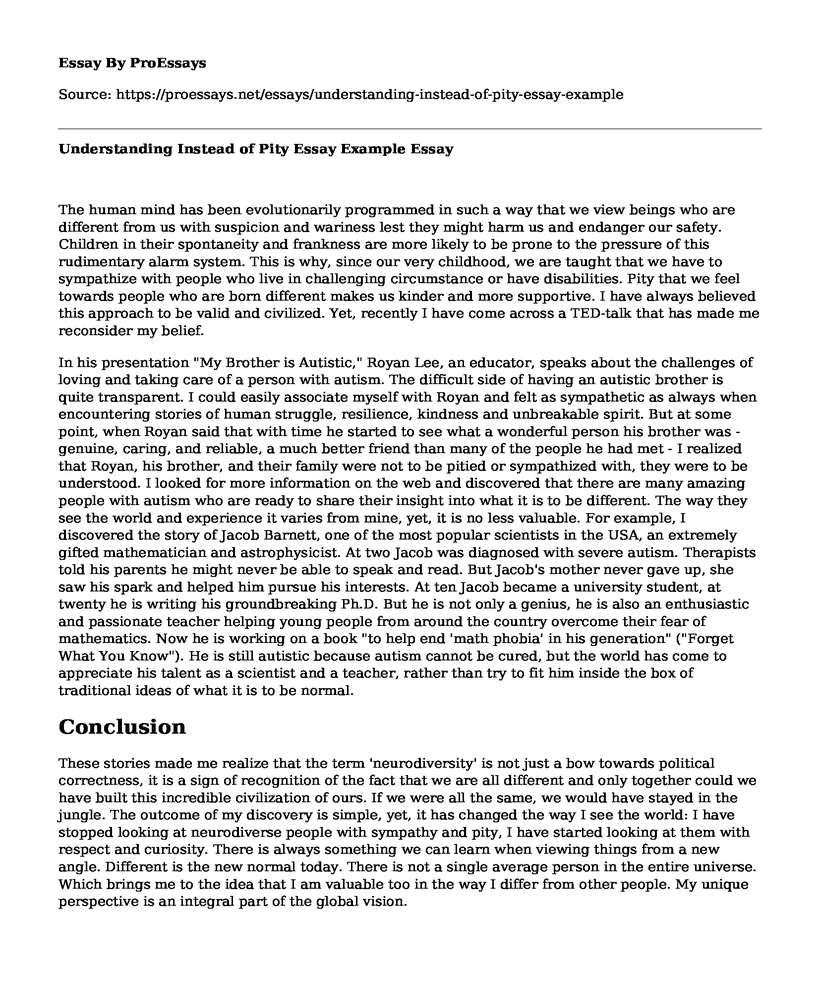The human mind has been evolutionarily programmed in such a way that we view beings who are different from us with suspicion and wariness lest they might harm us and endanger our safety. Children in their spontaneity and frankness are more likely to be prone to the pressure of this rudimentary alarm system. This is why, since our very childhood, we are taught that we have to sympathize with people who live in challenging circumstance or have disabilities. Pity that we feel towards people who are born different makes us kinder and more supportive. I have always believed this approach to be valid and civilized. Yet, recently I have come across a TED-talk that has made me reconsider my belief.
In his presentation "My Brother is Autistic," Royan Lee, an educator, speaks about the challenges of loving and taking care of a person with autism. The difficult side of having an autistic brother is quite transparent. I could easily associate myself with Royan and felt as sympathetic as always when encountering stories of human struggle, resilience, kindness and unbreakable spirit. But at some point, when Royan said that with time he started to see what a wonderful person his brother was - genuine, caring, and reliable, a much better friend than many of the people he had met - I realized that Royan, his brother, and their family were not to be pitied or sympathized with, they were to be understood. I looked for more information on the web and discovered that there are many amazing people with autism who are ready to share their insight into what it is to be different. The way they see the world and experience it varies from mine, yet, it is no less valuable. For example, I discovered the story of Jacob Barnett, one of the most popular scientists in the USA, an extremely gifted mathematician and astrophysicist. At two Jacob was diagnosed with severe autism. Therapists told his parents he might never be able to speak and read. But Jacob's mother never gave up, she saw his spark and helped him pursue his interests. At ten Jacob became a university student, at twenty he is writing his groundbreaking Ph.D. But he is not only a genius, he is also an enthusiastic and passionate teacher helping young people from around the country overcome their fear of mathematics. Now he is working on a book "to help end 'math phobia' in his generation" ("Forget What You Know"). He is still autistic because autism cannot be cured, but the world has come to appreciate his talent as a scientist and a teacher, rather than try to fit him inside the box of traditional ideas of what it is to be normal.
Conclusion
These stories made me realize that the term 'neurodiversity' is not just a bow towards political correctness, it is a sign of recognition of the fact that we are all different and only together could we have built this incredible civilization of ours. If we were all the same, we would have stayed in the jungle. The outcome of my discovery is simple, yet, it has changed the way I see the world: I have stopped looking at neurodiverse people with sympathy and pity, I have started looking at them with respect and curiosity. There is always something we can learn when viewing things from a new angle. Different is the new normal today. There is not a single average person in the entire universe. Which brings me to the idea that I am valuable too in the way I differ from other people. My unique perspective is an integral part of the global vision.
Works Cited
"Forget What You Know - Jacob Barnett." TEDxTeen, We Are Family Foundation, 2012, www.tedxteen.com/talks/forget-what-you-know-jacob-barnett.
Lee, Royan. My Brother is Autistic: The TED Talk. Royan Lee: Education, Parenting, Technology, 18 June 2016, royanlee.com/?p=5010.
Cite this page
Understanding Instead of Pity Essay Example. (2022, Oct 23). Retrieved from https://proessays.net/essays/understanding-instead-of-pity-essay-example
If you are the original author of this essay and no longer wish to have it published on the ProEssays website, please click below to request its removal:
- The Aging Processes Essay Example
- Empathy, Narrative, and Victim Impact Statements Paper Example
- Understanding Autism Spectrum Disorder (ASD): Causes, Symptoms & Treatment - Research Paper
- Paper Example on Depression Affects Millions - A Costly Mental Health Crisis
- Eating Disorders: Anorexia, Bulimia, Binge Eating & Body Dysmorphic Disorder - Essay Sample
- Essay Example on Developmental Psychology: Social Norms and the Human Life Course
- Mental Health And The Violence In Our Communities







